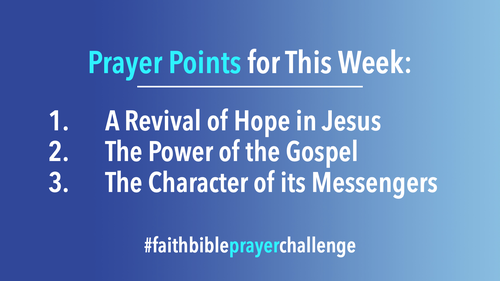Future Glory | Present Trial: 1 Thes. 1:2-5

Future Glory-Present Trial :: The Fight for Hope
1 Thessalonians 1:2-5
Last week we engaged the background and context of Paul’s first letter to the Church of Thessalonica. This week will we inch along in his opening prayer, which is replete with the beauty of unexpected turn of phrase and passion.
Even though we briefly looked at verse 2 last week, we will relook at it as the start of a single sentence that spans through verse 5. Verse 3 begins some of the content of Paul’s prayers for the young church. Notice the three central phrases he includes: work of faith, labor of love, steadfastness of hope. These “big three” are often linked together in the New Testament, especially by Paul. Faith, hope and love. According to Paul, love takes pride of place.
In these phrases, each descriptor is rather unexpected. In the New Testament, faith is consistently contrasted to works as the only condition for eternal life by faith in Jesus. But here Paul links the two, without confusing the truth of salvation. This “work of faith” could also be translated “manifestation of faith.” He is praying that they practically work out or walk out their faith in Jesus.
Similarly, “labor of love” should give the reader pause. Love is usually spoken of as something you feel. Here Paul prays for the church in a beautifully unexpected way. The word labor here means difficulty, burden or even discomfort. The word love is the Greek word agape. Thus Paul prays the the love of the church be expressed even in difficulty. There is often a burden to love.
Finally, he prays for their endurance or perseverance of hope, steadfastness. This is where we will spend some time today. The Old Testament concept of hope fully informs the use of the word in the New Testament, where it always has three components: an expectation for good in the future, trust and patient waiting. Usually one aspect is emphasized in a specific context and usage.
Hope is a fight. It is not easy to hold on to hope, especially when the devil seems to prioritize hopes destruction or disintegration in our life and culture. But hope is powerfully important to our mission.
The first sentence of Pau’s prayer ends with a celebration of God’s presence, God’s love and choosing, the power of the gospel and the character of Paul, Silas and Timothy. Each of these are critical in their own right and deserve thoughtful meditation and grateful worship.
Discussion Questions:
1 Thessalonians 1:2-5
Last week we engaged the background and context of Paul’s first letter to the Church of Thessalonica. This week will we inch along in his opening prayer, which is replete with the beauty of unexpected turn of phrase and passion.
Even though we briefly looked at verse 2 last week, we will relook at it as the start of a single sentence that spans through verse 5. Verse 3 begins some of the content of Paul’s prayers for the young church. Notice the three central phrases he includes: work of faith, labor of love, steadfastness of hope. These “big three” are often linked together in the New Testament, especially by Paul. Faith, hope and love. According to Paul, love takes pride of place.
In these phrases, each descriptor is rather unexpected. In the New Testament, faith is consistently contrasted to works as the only condition for eternal life by faith in Jesus. But here Paul links the two, without confusing the truth of salvation. This “work of faith” could also be translated “manifestation of faith.” He is praying that they practically work out or walk out their faith in Jesus.
Similarly, “labor of love” should give the reader pause. Love is usually spoken of as something you feel. Here Paul prays for the church in a beautifully unexpected way. The word labor here means difficulty, burden or even discomfort. The word love is the Greek word agape. Thus Paul prays the the love of the church be expressed even in difficulty. There is often a burden to love.
Finally, he prays for their endurance or perseverance of hope, steadfastness. This is where we will spend some time today. The Old Testament concept of hope fully informs the use of the word in the New Testament, where it always has three components: an expectation for good in the future, trust and patient waiting. Usually one aspect is emphasized in a specific context and usage.
Hope is a fight. It is not easy to hold on to hope, especially when the devil seems to prioritize hopes destruction or disintegration in our life and culture. But hope is powerfully important to our mission.
The first sentence of Pau’s prayer ends with a celebration of God’s presence, God’s love and choosing, the power of the gospel and the character of Paul, Silas and Timothy. Each of these are critical in their own right and deserve thoughtful meditation and grateful worship.
Discussion Questions:
- What do you recall as important about the background and context of Paul’s first letter to the Thessalonian church? (See Acts 17)
- In his opening prayer Paul mentions “steadfastness of hope.” How would you define hope?
- How is hope different from wishing?
- Read Romans 8:24-25 and discuss what Paul says about hope. How does this help you better understand 1 Thessalonians 1?
- Read Hebrews 11:1. How does hope relate to faith/trust?
- Read Revelation 12:7-12. Discuss in your group how the loud voice in heaven says about how believers overcome the devil and his great wrath upon the earth? (verse 11) How do these things relate to the New Testament concept of hope mentioned in the notes above?
- What, in your opinion, are the major cultural challenges to Christian hope right now? Share with the group.
- Why would Paul offer a prayer of thanksgiving for God’s “choice” of the Thessalonians? How would this be encouraging to them? (verse 4)
- Discuss what Paul says about the birth of the church in Thessalonica in verse 5. What is the contrast he sets up in this verse?
- Why do you think it is important that the messengers of the gospel be people of high character? (end of verse 5)
- Share with your group a time when failure or low character of a gospel messenger did damage or caused loss of hope for your personally.
- Spend some time in prayer after studying Paul’s prayer. Share your own short prayer of thanksgiving for your group or family - just like Paul did.

Posted in Sermon Notes
